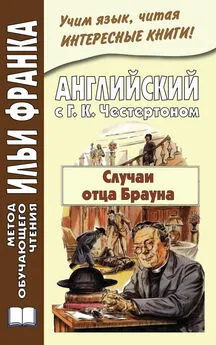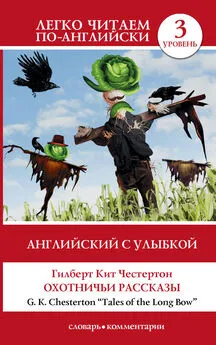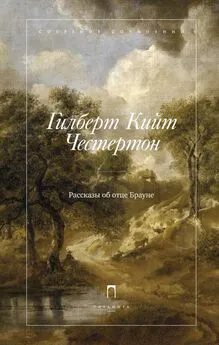Гилберт Честертон - Английский с Г. К. Честертоном. Случаи отца Брауна / Gilbert Keith Chesterton. The Sins of Prince Saradine. The Eye of Apollo
- Название:Английский с Г. К. Честертоном. Случаи отца Брауна / Gilbert Keith Chesterton. The Sins of Prince Saradine. The Eye of Apollo
- Автор:
- Жанр:
- Издательство:Литагент «Восточная книга»1243df63-7956-11e4-82c4-002590591ed2
- Год:2012
- Город:Москва
- ISBN:978-5-905971-41-9
- Рейтинг:
- Избранное:Добавить в избранное
-
Отзывы:
-
Ваша оценка:
Гилберт Честертон - Английский с Г. К. Честертоном. Случаи отца Брауна / Gilbert Keith Chesterton. The Sins of Prince Saradine. The Eye of Apollo краткое содержание
Продолжение приключений священника-детектива отца Брауна и его верного друга Фламбо в новеллах Г. К. Честертона «Грехи принца Сарадина» и «Глаз Аполлона». Рассказы адаптированы (без упрощения текста оригинала) по методу обучающего чтения Ильи Франка. Уникальность метода заключается в том, что запоминание слов и выражений происходит за счет их повторяемости, без заучивания и необходимости использовать словарь.
Пособие способствует эффективному освоению языка, может служить дополнением к учебной программе. Предназначено для широкого круга лиц, изучающих английский язык и интересующихся английской культурой.
Английский с Г. К. Честертоном. Случаи отца Брауна / Gilbert Keith Chesterton. The Sins of Prince Saradine. The Eye of Apollo - читать онлайн бесплатно ознакомительный отрывок
Интервал:
Закладка:

 “People like the Staceys always use fountain pens; but this was specially natural to Pauline. By habit and her strong will and memory she could still write almost as well as if she saw; but she could not tell when her pen needed dipping. Therefore, her fountain pens were carefully filled by her sister – all except this fountain pen. This was carefully not filled by her sister; the remains of the ink held out for a few lines and then failed altogether.
“People like the Staceys always use fountain pens; but this was specially natural to Pauline. By habit and her strong will and memory she could still write almost as well as if she saw; but she could not tell when her pen needed dipping. Therefore, her fountain pens were carefully filled by her sister – all except this fountain pen. This was carefully not filled by her sister; the remains of the ink held out for a few lines and then failed altogether.
And the prophet lost five hundred thousand pounds(а пророк потерял пятьсот тысяч фунтов; to lose ) and committed one of the most brutal and brilliant murders in human history for nothing(и напрасно совершил одно из самых жестоких и выдающихся убийств в истории человечества; for nothing – даром, зря ) .”
Flambeau went to the open door(Фламбо подошел к открытой двери) and heard the official police ascending the stairs(и услышал как по лестнице поднимаются «официальные» полицейские) . He turned and said(он обернулся и сказал) : “You must have followed everything devilish close(должно быть, вы чертовски пристально ко всему приглядывались; to follow – следовать, идти за; следить; close – близко, рядом; внимательно, тщательно ) to have traced the crime to Kalon in ten minutes(ибо за десять минут установили, что следы преступления ведут к Калону; to trace – проследить ) .”
Father Brown gave a sort of start(отец Браун вздрогнул; to give – давать; делать какое-л. движение или жест ).

 And the prophet lost five hundred thousand pounds and committed one of the most brutal and brilliant murders in human history for nothing.”
And the prophet lost five hundred thousand pounds and committed one of the most brutal and brilliant murders in human history for nothing.”
Flambeau went to the open door and heard the official police ascending the stairs. He turned and said: “You must have followed everything devilish close to have traced the crime to Kalon in ten minutes.”
Father Brown gave a sort of start.
“Oh! to him,” he said(о! к нему, – сказал он) . “No; I had to follow rather close(нет, мне пришлось весьма пристально приглядываться) to find out about Miss Joan and the fountain pen(чтобы разобраться с мисс Джоан и наливным пером) . But I knew Kalon was the criminal before I came into the front door(но я знал, что Калон – преступник, прежде чем вошел в парадную дверь /здания/) .”
“You must be joking!” cried Flambeau(вы, должно быть, шутите! – воскликнул Фламбо; to joke ).
“I’m quite serious,” answered the priest(я вполне серьезно, – отвечал священник) . “I tell you I knew he had done it(говорю же вам, я знал, что он сделал это) , even before I knew what he had done(даже до того, как я узнал, что он сделал) .”
“But why(но почему) ?”
“These pagan stoics,” said Brown reflectively(эти языческие стоики, сказал отец Браун задумчиво; to reflect – отражать /свет, звук/; раздумывать, размышлять ) , “always fail by their strength(всегда страдают: «терпят неудачу» из-за своей силы) . There came a crash and a scream down the street(внизу, на улице раздались грохот и крики) , and the priest of Apollo did not start or look round(а жрец Аполлона /даже/ не вздрогнул и не осмотрелся) . I did not know what it was(я не знал, что это было = что произошло) . But I knew that he was expecting it(но я знал, что он этого ждет) .”

 “Oh! to him,” he said. “No; I had to follow rather close to find out about Miss Joan and the fountain pen. But I knew Kalon was the criminal before I came into the front door.”
“Oh! to him,” he said. “No; I had to follow rather close to find out about Miss Joan and the fountain pen. But I knew Kalon was the criminal before I came into the front door.”
“You must be joking!” cried Flambeau.
“I’m quite serious,” answered the priest. “I tell you I knew he had done it, even before I knew what he had done.”
“But why?”
“These pagan stoics,” said Brown reflectively, “always fail by their strength. There came a crash and a scream down the street, and the priest of Apollo did not start or look round. I did not know what it was. But I knew that he was expecting it.”
Интервал:
Закладка:







